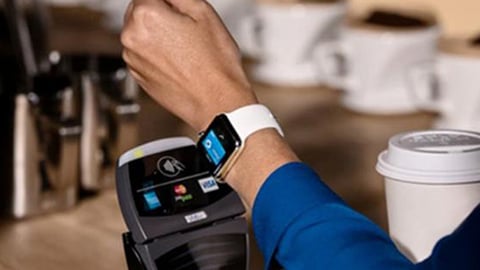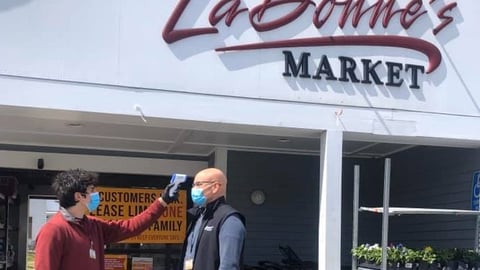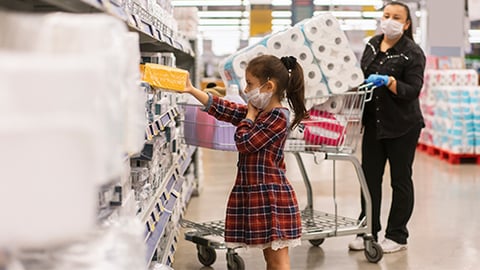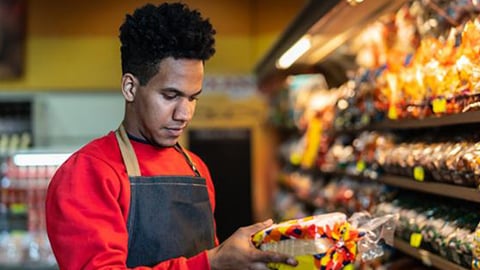Karns, Other Grocers Rush to Mandate Masks
Grocery store operators are facing more pressure to enforce mandates and voluntary guidelines requiring the use of face masks by shoppers.
One of the latest examples of this trend comes from the privately owned supermarket chain Karns Quality Foods, which operates 10 locations in Pennsylvania. About two weeks ago, the state’s governor requested that consumers wear face masks in public, including while shopping. Karns CEO Scott Karns told PennLive.com that compliance reached about 80% of shoppers. But as of 8 p.m. ET on Sunday, shoppers will no longer have a choice thanks to the recently issued state mandate requiring the wearing of face masks inside retail stores. Violators could face fines and arrest.
Karns, like probably all grocery store executives, hopes to encourage shoppers to comply without resorting penalties. Signs in store parking lots and entrances inform shoppers of the new mandate, and those who refuse to comply will be asked to leave, he told PennLive. Retailers, of course, retain the power to refuse service for a variety of reasons. As well, Karns and other grocers already require their own workers to wear masks and even gloves to keep them safe from the virus, and no retailer wants to receive a fine or the bad press that might follow.
Even with official mandates about face masks – which can serve to take some of the enforcement pressure off of grocery stores, at least in theory – grocery stores still face challenges with pandemic protection. As more stores issue their own face mask requirements – some backed by governmental orders, many others not – it is not always clear about how to best enforce those rules in a way that doesn’t burden an already stressed and exhausted workforce, or anger consumers. Indeed, some grocers still report that a good number of consumers don’t take seriously the need for masks, despite federal guidance in favor of wearing them.
For instance, Matt Fattah, the owner of a C-Town supermarket in Jersey City, N.J., recently told the New York Times that some customers continue to “laugh off” face mask requirements. That will keep getting harder. In New Jersey, police are reportedly making more arrests of violators of that state’s face mask mandate, and fining retailers that allow too many people into their stores at one time or have customers without face masks.
The list of governments and food retailers enacting face mask mandates or guides keeps growing day by day. Fresh Market, a North Carolina-based retailer, joined the face mask movement this week when it said that customers must wear them or be asked to leave. No enforcement mechanisms were detailed. Vons, a grocery store chain owned by Albertsons and which locations in Southern California and Southern Nevada, is another business that has recently told customers to wear face masks. That move puts Vons a step ahead of local public health departments, as they have not yet issued mandates.
On Monday (April 13), Nugget’s Market, a privately owned upscale chain based in California, set its own rule that all shoppers must wear face masks, or a scarf that covers the nose and mouth (that’s apparently in response to broader consumer complaints across the country about the shortage of face masks). The California Grocers Association is supporting such moves and predicting that a face mask requirement will soon enough be set all across the state. Putting all grocery stores on a level playing field, so to speak, could potentially make it easier for grocers to enforce those masking rules, as no customer could complain about being confused about different standards at different stores.
Different Face Mask Efforts
But the path to such a broad state – or national – standard still seems relatively long at this point in the pandemic. New York City, hit hard by the deadly pandemic, provides an example of that.
Mayor Bill de Blasio this week called on grocery stores in the five boroughs to require shoppers to wear masks. As the New York Post put it, “the mayor said that anyone who will not comply with wearing a facial covering ‘should not be allowed in,’ and noted that stores ‘have a right to have those rules in place’.” What happens if shoppers decline to follow that guidance? According to de Blasio, grocery store owners should dial the city’s 311 line, which could lead to what he called “help” from the New York City police department. What would happen after that was not entirely clear, though the police would likely just ask the non-compliant customer to leave the store.
Other major metro areas, unlike New York City, have gone beyond suggestions. The mayor of Miami-Dade County issued an emergency order a week ago that mandates facial coverings for all grocery store shoppers, along with other consumers and riders on busses. The order specifically said that people should not wear N95 masks – the idea is to save that supply for health care workers, police and firefighters – but set no specific penalties for noncompliance. Los Angeles is another major city with a similar law.
Food retailers’ response to the pandemic is an ongoing improvisation, guided by health and governmental guidelines and the drive to offer the best and safest service possible. What to do about face masks – or, rather, how to enforce the rules and guidelines, whether backed by force of law or not – remains a work in progress. But the main signals over the past 10 days or so strongly indicate that governmental pressure is picking up, and that shoppers who don’t comply are facing steadily increasing odds of being fined or perhaps arrested.





